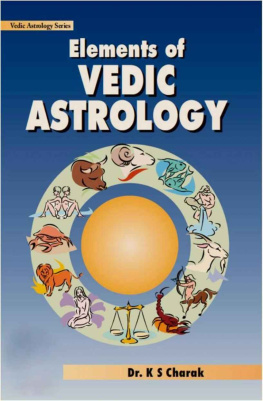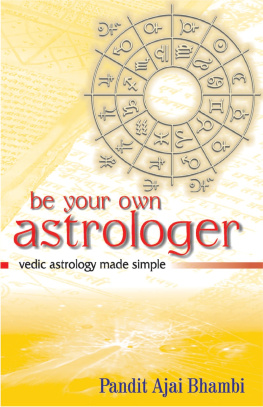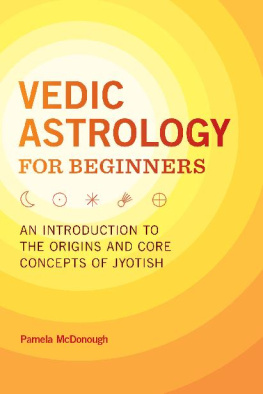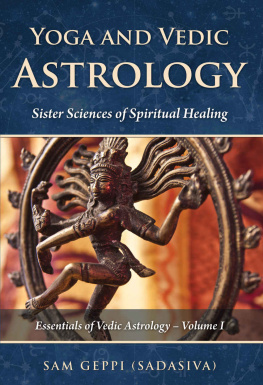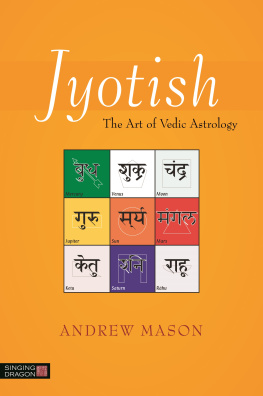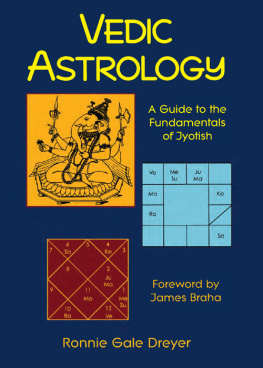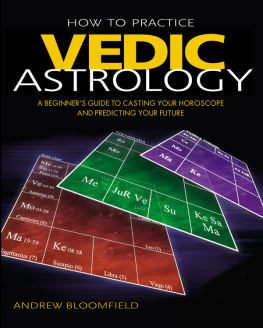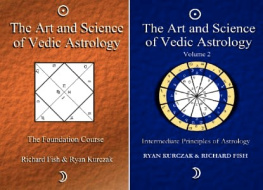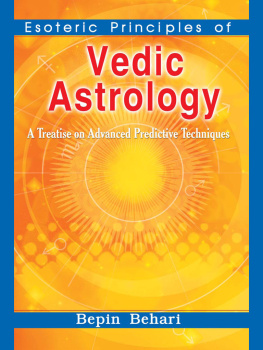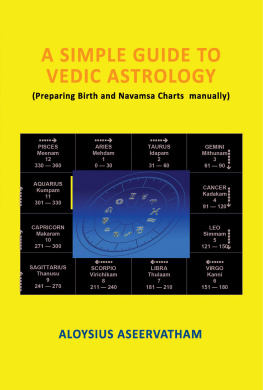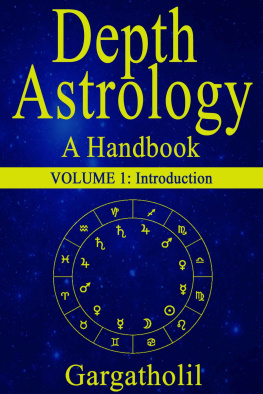Charak - Elements of Vedic Astrology (2 Volume Set)
Here you can read online Charak - Elements of Vedic Astrology (2 Volume Set) full text of the book (entire story) in english for free. Download pdf and epub, get meaning, cover and reviews about this ebook. year: 2006, publisher: UMA Publications, genre: Children. Description of the work, (preface) as well as reviews are available. Best literature library LitArk.com created for fans of good reading and offers a wide selection of genres:
Romance novel
Science fiction
Adventure
Detective
Science
History
Home and family
Prose
Art
Politics
Computer
Non-fiction
Religion
Business
Children
Humor
Choose a favorite category and find really read worthwhile books. Enjoy immersion in the world of imagination, feel the emotions of the characters or learn something new for yourself, make an fascinating discovery.
Elements of Vedic Astrology (2 Volume Set): summary, description and annotation
We offer to read an annotation, description, summary or preface (depends on what the author of the book "Elements of Vedic Astrology (2 Volume Set)" wrote himself). If you haven't found the necessary information about the book — write in the comments, we will try to find it.
Charak: author's other books
Who wrote Elements of Vedic Astrology (2 Volume Set)? Find out the surname, the name of the author of the book and a list of all author's works by series.
Elements of Vedic Astrology (2 Volume Set) — read online for free the complete book (whole text) full work
Below is the text of the book, divided by pages. System saving the place of the last page read, allows you to conveniently read the book "Elements of Vedic Astrology (2 Volume Set)" online for free, without having to search again every time where you left off. Put a bookmark, and you can go to the page where you finished reading at any time.
Font size:
Interval:
Bookmark:
Elementsof
VEDIC
ASTROLOGY
VOLUMES
1& 2
Dr. K S Charak
M.S. (SURGERY)
F.R.C.S. (U.K.)
UMA
Publications
Elements ofVedic Astrology
Volume 1 &2
Dr. K.S. Charak
All rightsreserved, including the right to reproduce this book or portions thereof in anyform whatsoever.
First Edition: June 1995
SecondEdition: September 1996
Third Edition:September 1998
Reprint: June2001
FourthEdition: July 2006
Reprint:January 2010
ISBN 81-901008-0-7 (Set)
Published by:
UMAPublications
72 GaganVihar, Delhi-110051, India
Phone:91-11-2254 3563
E-mail:
Dedicated
to the memory of my brother
BishanS. Charak
whom I lost to the USA
Preface to the FourthEdition
The Elementsof Vedic Astrology has been acclaimed as the most systematic,comprehensive and compact work on the Parashari system of astrology. For thepast over one decade, its supremacy has remained unchallenged. It remains astandard book for those seeking initiation into Vedic astrology while, for themore advanced and the researcher in astrology, it serves as a reference book.This work has verily been appreciated by the student and the teacher ofastrology alike. It retains a stature against which all other similar works onVedic astrology are judged.
The present edition has been completely revised andenlarged. A whole new chapter on the Sudarshana Chakra of Parashara has beenadded at the end. The Sudarshana Chakra method of analysis is supposed toprovide a highly accurate assessment of a chart. It is hoped that the inclusionof this chapter in the present edition will enable the serious student of Vedicastrology to markedly enhance his predictive ability.
DR. K.S. CHARAK
August 1, 2006
72 Gagan Vihar
Delhi - 110051(India)
Preface to the First Edition
Teaching astrology to highly educated and elite classes ofstudents in the Bharatiya Vidya Bhavan, New Delhi, has imposed great demands onthe teaching faculty here to maintain and upgrade their quality of teaching. Adirect consequence of this has been the production of several high standardbooks by the faculty members. Stress has been placed on illustrating thevarious astrological principles and techniques by suitable examples. Thescientific basis of astrology has been proved repeatedly by illustrating theprinciples which give replicable results.
Study of Vedic astrology demands an elementary knowledge ofastronomy and some basic techniques concerned with the preparation ofhoroscopic charts. Understanding the static promise in a horoscope, and thedynamic aspect of timing the fruition of such promise, are areas which demanddeeper study. Vedic astrology has at its disposal innumerable techniques whichcan be employed for virtually infallible results. Not all techniques are to beused by every practitioner of Vedic astrology on all horoscopes. But aknowledge of most of these is desirable. Eventually, each astrologer developshis standard technique which suits him the best.
Elements of Vedic Astrology is directed towardsproviding the basic principles of Vedic astrology. It highlights the scientificbasis of astrology. The initial few chapters are directed towards clarifyingthe fundamental principles of astrology. The basic concepts of astronomy as arerelevant to a study of astrology are described clearly. An example of thehighly evolved ancient Indian method of teaching has been taken from acelebrated scripture; it highlights the simple yet lucid style of impartingscientific-spiritual instruction to a disciple. Some important areas of astrologyconcerned with the characteristics of rashis, houses and planets, the nature ofplanets, and the significations of houses and planets, have all been describedin great details. Two chapters have been devoted to the techniques of casting ahoroscopic chart. It may be pertinent to point out here that an understandingof the manual method of casting of a horoscope has vast advantages and must bemastered fully. Reliance may later be placed on computerised calculations if sodesired.
Subtle areas of astrology, like the planetary states(Avasthas) and the sub-planets, have been discussed briefly and areas forfurther research indicated. The use of vargas, or subtle divisions, has beenexplained. The Vimshottari dasha system has been dealt with in details while theYogini dasha has been described briefly in order to provide an additionalconfirmatory tool. A vast amount of information gathered from standardclassical texts of astrology in respect of the placement of planets indifferent houses or rashis, and the various planetary influences on them, hasbeen provided.
The stature of a horoscope is reflected in the presence orabsence of the all-important planetary yogas in a horoscope. These must berecognised at the outset, and their quality judged, in order to assess thepotential inherent in a chart. Three full chapters have been devoted to thisaspect along with illustrative examples.
Determination of longevity is a tricky area in astrology.Some standard methods of calculating the span of life along with their pitfallshave been described.
Specialised predictive areas of Vedic astrology have beentouched briefly in order to acquaint the reader of such additional predictivetools. These include medical astrology, horary astrology, transits, annualcharts and Ashtakavarga. One chapter has been devoted to the Muhurta orelectional aspect of astrology. Greater understanding of these areasnecessitates further study, an aspect which has been hinted at appropriately.
The book deals solely with the Parashari system which is themost prevalent system of Vedic astrology. No attempt has been made totransgress into the other parallel system known as the Jaimini system which isless in vogue, is less well understood, and needs a lot of research beforebeing universally applicable.
The work is primarily meant for those who want to learnastrology from the very beginning, and pursue it seriously in a scientificmanner. It will serve as a stepping stone for those who want to eventually gointo specialised branches of astrology. It is also aimed to help those whointend to indulge in astrological research in hitherto unexplored areas likethe vargas, the sub-planets, or the planetary states, etc.
My efforts will be more than rewarded if this workfulfils its intended aims.
DR. K.S. CHARAK
May 25, 1995
72 Gagan Vihar
Delhi - 110051(India)
Contents
...I...

Aum! May He protect us both (the teacher and thedisciple) together. May He sustain us both together. May we attain vigourtogether. May the learning of us both be resplendent. May we harbour no mutualill will.
Aum! Peace! Peace! Peace
Kathopanishad
Astrology is as old as the Vedasthemselves. The Vedas, which are the sacred Hindu scriptures, embody eternalknowledge. Strict moral and spiritual practices along with a deep study are theprerequisites to understand the essence of the Vedas. To the uninitiated, theVedas might appear as nothing more than ritualistic oblations to air, water andthunder, etc. Deep truths, however, begin to unfold to the true seeker as hissearch goes on.
In times of yore, sincere seekers of truth and knowledge inIndia used to spend years and years at the feet of their gurus, learning themeanings hidden in the Vedas.
In order to decipher what lies concealed in the Vedas, astudy of certain subjects is considered a prerequisite. These subjects arecalled the Vedangas or the body organs of the Vedas. There are six suchVedangas. They are:
Next pageFont size:
Interval:
Bookmark:
Similar books «Elements of Vedic Astrology (2 Volume Set)»
Look at similar books to Elements of Vedic Astrology (2 Volume Set). We have selected literature similar in name and meaning in the hope of providing readers with more options to find new, interesting, not yet read works.
Discussion, reviews of the book Elements of Vedic Astrology (2 Volume Set) and just readers' own opinions. Leave your comments, write what you think about the work, its meaning or the main characters. Specify what exactly you liked and what you didn't like, and why you think so.

